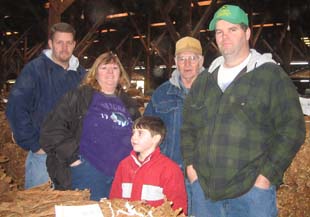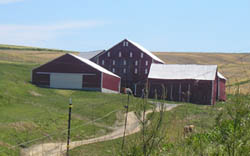|
Back in Business: Md. Family Rekindles
Family Tradition
 |
| The Connellys grew three-quarters of an
acre of tobacco last year and sold it at the auction in March for $1.50 a pound.
Pictured at the auction are, from left: Michael Hawse (Beverly's brother), Beverly Connelly,
6-year-old Branden
Connelly, Ralph Connelly (Bruce's father)
and Bruce Connelly.
(Newsline photo by Jennifer
Fu) |
By Nick Sekkas
Maryland Newsline
Tuesday, May 16, 2006
CLARKSBURG, Md. - Beverly Connelly and her family last
year jumped back into a business that the state has
convinced most Maryland farmers to leave.
The Connellys, of Clarksburg, are now
the only family in Montgomery County growing tobacco, said
David Conrad, tobacco specialist for the Maryland
Cooperative Extension.
Most Maryland tobacco farmers stopped
growing the crop after the state began paying them to grow
alternative crops in 1999.
What pulled the Connellys back in?
“Mainly because of the family
tradition,” Connelly said. “We wanted to try and get back
into it and reestablish it in our family.”
“We’re doing it more as a hobby than to
make a ton of money off of it,” she added. The family broke
even this year, she said, and hopes to make a profit next year.
There are only about 150 tobacco
farmers left in the state, down from about 1,100 tobacco
farmers just 10 years ago, Conrad said.
The Connellys have a long family
history in the industry. Their 6-year-old son, Branden, will
be the sixth generation in the family to farm tobacco, said
Beverly Connelly and her husband, Bruce.
“Last year I made sure that Branden
planted something on the farm,” Bruce Connelly said. “We
want to keep the farm going within the family.”
Beverly’s grandfather, John Glaze,
started harvesting tobacco in Montgomery County when he was
10 years old. Glaze, 84, and his late brother, Earl, used to
raise about 10 acres of tobacco on their farm, situated
along Burnt Hill Road. They stopped raising tobacco in
1986, Glaze said.
“They were getting too old for the
day-to-day labor of it,” Beverly said.
“We couldn’t get any help on the farm,”
Glaze agreed. “People want to make big wages, and Earl and I
were getting up in years.”
Back in those days, Glaze and his
family counted on tobacco as their main money crop on the
farm despite also raising corn, wheat, hay and cows, he
said.
“Ten acres of tobacco is a lot of tobacco,” he said.
On the side, he taught and continues to teach string
instruments out of a studio in his basement.
In 1975, Glaze recalls selling his best
grades of tobacco at auction for $1.70 a pound -- 20 cents a
pound more than the family’s tobacco fetched at the annual
auction in Charles County in March.
“There was a greater demand for it
then,” Glaze said. “It’s not the same around here anymore.”
Bruce Connelly grew up on a farm in
Boyds, Md. and was inspired to keep his wife’s family
tradition alive by trying out tobacco farming, he said.
Bruce, 39, also works four days a week
as a gardener at the National Institute of Standards and
Technology. He focuses his attention on the farm on his days
off.
Beverly, 37, works four to five days a
week as
a physical science technician in the Dimensional Metrology
Group for the NIST.
Work on the farm is continuous.
“Tobacco is a year-round crop,” Bruce said. “As soon as you
finish [one crop], you have to start all over again.”
In the spring he said he starts the seeds, in
the summer he begins planting, in the fall he harvests, and
in the winter he tends the crop as it dries.
The tobacco must stay in the barn until
it is packed, so that it won’t crumble when touched.
It also must be sprayed frequently in order to keep worms
from growing on it, Bruce said.
“The ideal weather for storing tobacco
is having the temperature in the 40s and light rain. The
worst is warm days and cold nights,” Bruce said.

|
| The Connellys' tobacco barns in
Montgomery County, Md.
(Newsline photo by Nick Sekkas) |
In terms of labor, Bruce said that he
gets a lot of help from his family and from a few close friends
who are interested in the attempted rebirth of tobacco
farming in Montgomery County.
Beverly, Branden and other family
members assist Bruce in any way they can, helping to plant,
pick and hang the crop for drying time.
“It’s hard work,” Bruce agreed. “But
I’ve been on farms my whole life, and it’s relaxing for me.
A 10-hour day on the farm is better than a full day at work”
elsewhere, he said.
All three family members attended the
March tobacco auction in Hughesville, Md. They sold their
crop to the Maryland Tobacco Co. in Farmhill, Va.
“We were actually able to contact [the
person] who bought our crop, and we will sell to him
directly next year,” Beverly said. The Connellys said they
hope the profits will be better with no third party in
between.
The highest bid for a pound of tobacco
at this year’s auction was $1.80.
Bruce said he hopes other farmers in
the state will continue to grow tobacco, despite state
incentives to abandon the crop.
“We want to make it so that the future
generations can farm, and they don’t have the restrictions
on it,” he said.
Top of Page | Home
Page
Copyright © 2006 University of Maryland Philip Merrill College of Journalism. All rights reserved. Reproduction in
whole or in part without permission is prohibited.
|
